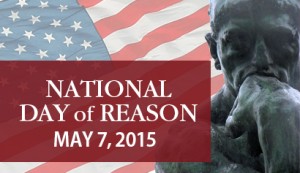A “DoR” or a “DoP”? Reason Unites While Prayer Divides

In just three short weeks, the National Day of Reason (NDoR) will be celebrated by atheists, humanists, and religious people across the country and around the world. For those who don’t know, the National Day of Reason is an annual observance held in parallel with the National Day of Prayer (NDoP) on the first Thursday in May each year, which means it takes place this year on May 7.
According to the official National Day of Prayer website, NDoP is meant to encourage Americans “to pray for the nation…and to mobilize the Christian community to intercede for America’s leaders and its families.” The website even notes that the organization which runs the annual holiday “represents a Judeo-Christian expression of the national observance, based on our understanding that this country was birthed in prayer and in reverence for the God of the Bible.”
This holiday is infamous for getting politicians to participate publically in prayer, and its history is linked with government endorsement of prayer and religion in general (and Christianity in particular). The NDoP website notes that the holiday was made an official annual day of observance by Congress and President Truman in 1952. What’s even more shocking is the fact that the president typically signs a proclamation which calls on Americans to pray, and government officials at the federal, state, and local levels to participate in prayer ceremonies as representatives of the government. In fact, since 1952 sixty-six National Day of Prayer presidential proclamations have been issued, and several presidents, including Gerald Ford, George H. W. Bush, and Barack Obama have issued multiple NDoP proclamations in the same year.
The National Day of Reason was created to call attention to this unconstitutional event, in addition to celebrating reason and its societal benefits. Seeing as how the National Day of Prayer excludes the nearly 20 percent of all Americans who aren’t religious, the NDoR works instead to promote something that all Americans, including the most religious, use at least several times a day: reason-based thinking.
On the National Day of Reason, local humanist groups hold fun events like the annual Reasonfest in South Carolina, and participate in community service projects, such as a blood drive held last year in California. In addition, NDoR proclamations are issued by government officials, including governors, mayors, and city councils, which honor the holiday by supporting the application of reason while also including all Americans, not just the religious, in the day of celebration.
The American Humanist Association is even working with certain members of the US Congress to get national recognition of the National Day of Reason, with more details to come as the big day approaches. (Incidentally, May 7 marks the first day of the AHA’s annual conference which includes a NDoR reception). Needless to say, government officials at the federal, state, and local level are finally realizing that government-supported holidays need to be inclusive and must not violate the foundational principles of our country the way that the National Day of Prayer consistently does by weakening the separation between church and state.
Holidays that enjoy government support must strive to unite Americans rather than divide them on religious, political, or other grounds. It only stands to reason that on May 7, 2015, Americans should celebrate NDoR, not NDoP.
